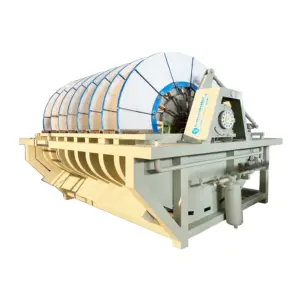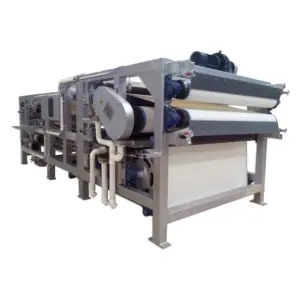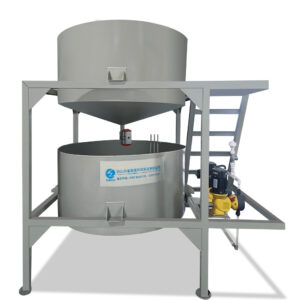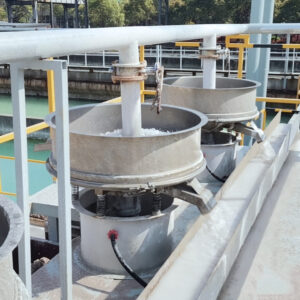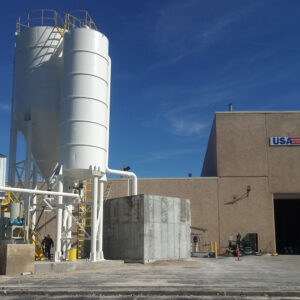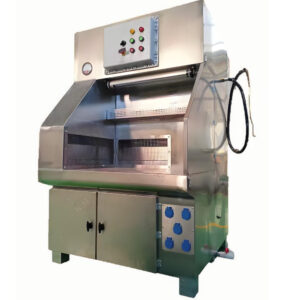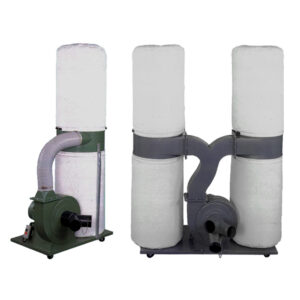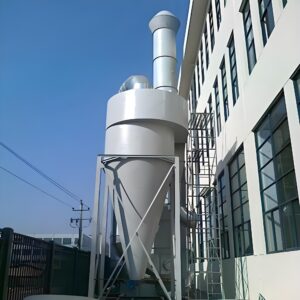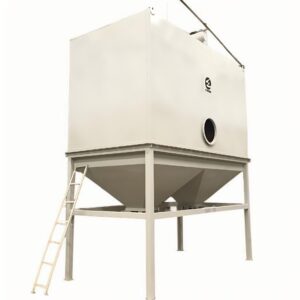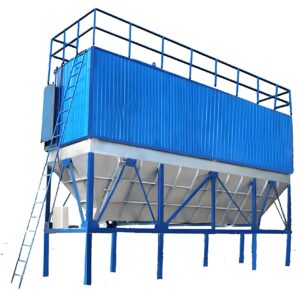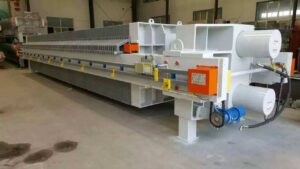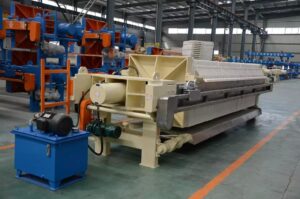In the world of industrial cake production, efficiency and quality are paramount. As bakeries scale up their operations to meet growing demand, they must find innovative ways to streamline their processes while maintaining the delicious taste and texture that consumers expect. Enter the belt filter press, a versatile piece of equipment that has found its way into the cake production industry, revolutionizing the way bakers handle ingredients and manage waste. This article will explore the various applications of belt filter presses in cake production, highlighting how this technology is enhancing productivity and sustainability in bakeries around the world.
The belt filter press, traditionally used in wastewater treatment and mining industries, has proven to be an invaluable asset in cake production applications. From ingredient preparation to waste management, this equipment offers a range of benefits that address common challenges faced by large-scale bakeries. By efficiently separating solids from liquids, belt filter presses help optimize ingredient consistency, reduce waste, and improve overall product quality.
As we delve deeper into the world of industrial cake production, we'll examine how belt filter presses are being integrated into various stages of the baking process. From filtration of fruit purees to the recovery of valuable ingredients from waste streams, this technology is making a significant impact on the industry. We'll explore the specific applications, benefits, and considerations for implementing belt filter presses in cake production facilities, providing insights that can help bakeries enhance their operations and stay competitive in a rapidly evolving market.
Belt filter presses have become an essential tool in modern cake production facilities, offering improved efficiency, reduced waste, and enhanced product quality throughout the baking process.
How are belt filter presses used in ingredient preparation for cake production?
When it comes to creating the perfect cake, the quality and consistency of ingredients are crucial. Belt filter presses play a significant role in ingredient preparation, particularly in the processing of fruit purees and other liquid or semi-liquid components used in cake recipes.
In large-scale cake production, using fresh fruits or pre-made purees can lead to inconsistencies in texture and moisture content. Belt filter presses help address this issue by efficiently separating solids from liquids, resulting in a more uniform ingredient consistency.
The process begins by feeding the raw fruit puree or mixture into the belt filter press. As the material passes through the system, pressure is applied, forcing liquids through the filter media while retaining solids on the belt. This separation allows bakers to control the moisture content and texture of their fruit-based ingredients with precision.
Belt filter presses can reduce the moisture content of fruit purees by up to 50%, resulting in more consistent cake batters and improved final product quality.
| Fruit Type | Initial Moisture Content | Final Moisture Content After Belt Filter Press |
|---|---|---|
| Strawberry | 90% | 45-50% |
| Apple | 85% | 40-45% |
| Banana | 75% | 35-40% |
By using belt filter presses in ingredient preparation, bakeries can achieve several benefits. First, the consistent moisture content of ingredients leads to more predictable baking results, reducing variations in cake texture and density. Second, the removal of excess moisture can help extend the shelf life of both the ingredients and the final products. Finally, the ability to process large volumes of ingredients quickly and efficiently supports increased production capacity, allowing bakeries to meet growing demand without compromising quality.
What role do belt filter presses play in waste management for cake production facilities?
Waste management is a critical concern for any food production facility, and cake bakeries are no exception. Belt filter presses have emerged as a valuable tool in managing and reducing waste in cake production processes, offering both environmental and economic benefits.
One of the primary applications of belt filter presses in waste management is the treatment of wastewater generated during cake production. This wastewater often contains high levels of organic matter, including fats, oils, and suspended solids from ingredients like flour and sugar.
By implementing a belt filter press system, bakeries can effectively separate solid waste from liquid effluent, reducing the volume of waste that needs to be disposed of and improving the quality of water that is released back into the environment or municipal systems.
Implementing a belt filter press for wastewater treatment can reduce the volume of solid waste by up to 80%, significantly lowering disposal costs and environmental impact for cake production facilities.
| Waste Type | Volume Reduction | Cost Savings |
|---|---|---|
| Organic Solids | 70-80% | 50-60% |
| Fats and Oils | 60-70% | 40-50% |
| Mixed Waste | 65-75% | 45-55% |
Beyond wastewater treatment, belt filter presses can also be used to recover valuable ingredients from waste streams. For example, excess batter or trimmings from cake production can be processed through a belt filter press to separate usable ingredients from waste. This not only reduces overall waste but can also lead to cost savings by recovering and reusing ingredients that would otherwise be discarded.
Furthermore, the dewatered cake solids produced by belt filter presses can often be repurposed for other uses, such as animal feed or composting, further reducing the environmental impact of cake production facilities. By incorporating belt filter presses into their waste management strategies, bakeries can demonstrate their commitment to sustainability while also improving their bottom line through reduced waste disposal costs and increased resource efficiency.
How do belt filter presses improve quality control in cake production?
Quality control is paramount in cake production, where consistency and adherence to recipe specifications can make or break a product's success. Belt filter presses contribute significantly to quality control measures, ensuring that ingredients and processes meet the exacting standards required for high-quality cake production.
One of the key ways belt filter presses enhance quality control is through the precise management of moisture content in ingredients. By allowing bakers to adjust and standardize the water content in fruit purees, batters, and other liquid components, these machines help maintain consistent texture and baking properties across batches.
Additionally, belt filter presses can be used to remove impurities and unwanted particles from liquid ingredients, ensuring a smoother, more uniform final product. This is particularly important when dealing with natural ingredients that may contain varying levels of solids or impurities.
Belt filter presses can achieve filtration accuracy down to 20 microns, removing up to 99% of suspended solids from liquid ingredients used in cake production.
| Ingredient Type | Particle Size Removed | Improvement in Consistency |
|---|---|---|
| Fruit Purees | 20-50 microns | 95-98% |
| Liquid Batters | 30-60 microns | 90-95% |
| Cream Fillings | 10-30 microns | 97-99% |
The use of belt filter presses in quality control extends beyond ingredient preparation. These machines can also be employed in the testing and analysis of cake batters and finished products. By processing samples through a belt filter press, quality control teams can quickly assess moisture content, solid-to-liquid ratios, and other key parameters that impact cake quality.
Furthermore, the data collected from belt filter press operations can be integrated into broader quality management systems, providing valuable insights into process consistency and helping identify areas for improvement. This data-driven approach to quality control allows bakeries to maintain high standards while continually optimizing their processes for better efficiency and product quality.
Can belt filter presses enhance the nutritional profile of cakes?
In an era where consumers are increasingly health-conscious, bakeries are always looking for ways to enhance the nutritional profile of their products without compromising on taste or texture. Belt filter presses offer intriguing possibilities in this area, potentially contributing to the creation of healthier cake options.
One of the primary ways belt filter presses can enhance the nutritional profile of cakes is through the efficient processing of whole fruit ingredients. By effectively separating seeds, skins, and other fibrous materials from fruit purees, these machines allow bakers to incorporate more whole fruit into their recipes while maintaining a desirable texture.
This increased use of whole fruits can boost the fiber content of cakes, as well as increase the concentration of vitamins, minerals, and beneficial phytonutrients. Additionally, the ability to precisely control moisture content means that less sugar may be needed to achieve the desired sweetness and texture, potentially reducing the overall calorie content of the final product.
Utilizing belt filter presses in fruit puree preparation can increase the fiber content of fruit-based cakes by up to 30% while maintaining optimal texture and moisture levels.
| Fruit Type | Fiber Increase | Vitamin C Retention |
|---|---|---|
| Berries | 25-30% | 80-85% |
| Citrus | 20-25% | 85-90% |
| Stone Fruit | 15-20% | 75-80% |
Belt filter presses can also play a role in the incorporation of alternative, nutrient-dense ingredients into cake recipes. For example, vegetable purees or nut-based ingredients can be processed to achieve the right consistency for cake batters, allowing for the creation of vegan or gluten-free options with improved nutritional profiles.
Moreover, the precise control over ingredient consistency provided by belt filter presses enables bakers to experiment with reduced-fat formulations. By carefully managing the moisture content of batters, it's possible to create cakes with lower fat content that still maintain the moist, tender texture consumers expect.
While enhancing the nutritional profile of cakes is a complex challenge that involves many factors, the versatility and precision of belt filter presses provide bakers with valuable tools to explore healthier cake options without sacrificing quality or taste.
How do belt filter presses contribute to sustainable cake production practices?
Sustainability has become a key focus for many industries, and the cake production sector is no exception. Belt filter presses play a significant role in promoting sustainable practices within bakeries, contributing to reduced resource consumption, improved waste management, and overall environmental responsibility.
One of the primary ways belt filter presses enhance sustainability is through their efficient use of water and energy. By effectively separating solids from liquids, these machines reduce the amount of water needed in various cake production processes, from ingredient preparation to equipment cleaning. This not only conserves water but also reduces the energy required for heating and pumping water throughout the facility.
Additionally, belt filter presses contribute to waste reduction by maximizing ingredient utilization and minimizing the volume of waste that requires disposal. By recovering usable materials from waste streams and reducing the moisture content of solid waste, these machines help bakeries lower their environmental impact and reduce costs associated with waste management.
Implementing belt filter presses in cake production facilities can lead to a 30-40% reduction in water usage and a 20-25% decrease in overall energy consumption related to waste management processes.
| Sustainability Metric | Improvement with Belt Filter Press |
|---|---|
| Water Usage Reduction | 30-40% |
| Energy Consumption Reduction | 20-25% |
| Waste Volume Reduction | 60-70% |
| Ingredient Recovery | 15-20% |
Belt filter presses also support sustainable practices by enabling the recovery and reuse of valuable ingredients. For example, excess batter or trimmings that would typically be discarded can be processed to reclaim usable components, reducing both waste and the need for new raw materials. This closed-loop approach to ingredient management aligns with circular economy principles, minimizing resource consumption and environmental impact.
Furthermore, the use of belt filter presses can contribute to the development of more sustainable packaging solutions. By precisely controlling the moisture content of cake products, bakeries can potentially extend shelf life without the need for additional preservatives or excessive packaging materials.
As the cake production industry continues to evolve, the role of belt filter presses in promoting sustainable practices is likely to grow. These versatile machines not only improve efficiency and product quality but also help bakeries meet growing consumer demand for environmentally responsible food products.
What are the economic benefits of incorporating belt filter presses in cake production?
When considering any new technology or equipment for cake production, the economic impact is a crucial factor. Belt filter presses offer several economic benefits that make them an attractive investment for bakeries looking to optimize their operations and improve their bottom line.
One of the primary economic advantages of belt filter presses is their ability to increase production efficiency. By streamlining ingredient preparation and waste management processes, these machines can significantly reduce labor costs and processing times. This increased efficiency allows bakeries to produce more cakes in less time, potentially boosting overall output and revenue.
Additionally, belt filter presses contribute to cost savings through improved ingredient utilization and waste reduction. By recovering usable materials from waste streams and minimizing ingredient loss during processing, bakeries can lower their raw material costs and reduce expenses associated with waste disposal.
Bakeries implementing belt filter presses have reported an average reduction in production costs of 15-20%, with some facilities achieving savings of up to 25% on ingredient and waste management expenses.
| Cost Category | Potential Savings |
|---|---|
| Labor Costs | 10-15% |
| Ingredient Costs | 15-20% |
| Waste Disposal Costs | 30-40% |
| Energy Costs | 5-10% |
The precision and consistency provided by belt filter presses can also lead to economic benefits through improved product quality. By ensuring consistent ingredient properties and moisture content, these machines help reduce product defects and waste due to quality issues. This not only saves money on wasted ingredients but also helps maintain customer satisfaction and brand reputation, which are crucial for long-term business success.
Furthermore, the versatility of belt filter presses allows bakeries to explore new product lines and niche markets. For example, the ability to efficiently process alternative ingredients opens up opportunities in the growing markets for vegan, gluten-free, or health-focused cake products. This diversification can lead to new revenue streams and increased market share.
While the initial investment in belt filter press technology may be substantial, many bakeries find that the long-term economic benefits far outweigh the upfront costs. The combination of increased efficiency, reduced waste, improved quality, and new product opportunities makes belt filter presses a valuable asset in the competitive cake production industry.
How do belt filter presses impact the scalability of cake production operations?
As bakeries look to expand their operations and meet growing demand, scalability becomes a critical consideration. Belt filter presses play a significant role in enabling cake production facilities to scale up efficiently, offering solutions that can adapt to increasing production volumes while maintaining product quality and operational efficiency.
One of the key ways belt filter presses support scalability is through their ability to handle large volumes of materials consistently. Unlike manual or smaller-scale filtration methods, these machines can process substantial quantities of ingredients or waste streams without a proportional increase in labor or time requirements. This means that as production volumes grow, bakeries can rely on their belt filter press systems to keep pace without creating bottlenecks in the production process.
Additionally, belt filter presses offer modularity and flexibility that align well with scaling operations. Bakeries can often add additional press units or upgrade existing systems to increase capacity as needed, allowing for gradual expansion without the need for complete overhauls of production lines.
Belt filter presses can typically handle a 50-100% increase in production volume with only minimal adjustments to equipment and processes, facilitating smooth scaling of cake production operations.
| Production Scale | Belt Filter Press Capacity | Scalability Factor |
|---|---|---|
| Small Bakery | 100-500 kg/hour | 2-3x |
| Medium Bakery | 500-2000 kg/hour | 3-4x |
| Large Industrial | 2000+ kg/hour | 4-5x |
The consistency and precision offered by belt filter presses also contribute to scalability by ensuring that product quality remains high even as production volumes increase. This is particularly important for bakeries expanding into new markets or distribution channels, where maintaining consistent quality across larger batches is essential for building and retaining customer trust.
Furthermore, the data collection and process control capabilities often integrated with modern belt filter press systems provide valuable insights for managing scaled-up operations. These systems can help identify inefficiencies, optimize processes, and maintain quality control across larger production runs, ensuring that scaling up doesn't come at the cost of operational excellence.
By incorporating belt filter presses into their production strategies, bakeries can position themselves for sustainable growth, confident in their ability to meet increasing demand while maintaining the quality and efficiency that are crucial for success in the competitive cake production industry.
Conclusion
The integration of belt filter presses into cake production applications represents a significant advancement in the industry, offering a wide range of benefits that address key challenges faced by modern bakeries. From improving ingredient consistency and quality control to enhancing sustainability and facilitating scalable operations, these versatile machines have proven their value across various aspects of cake production.
As we've explored, belt filter presses contribute to more efficient ingredient preparation, allowing for precise control over moisture content and texture in fruit purees and other liquid components. They play a crucial role in waste management, reducing disposal costs and environmental impact while recovering valuable materials. In quality control, these machines ensure consistency and purity in ingredients and finished products, contributing to the high standards expected by consumers.
Moreover, belt filter presses open up possibilities for healthier cake options by enabling the incorporation of whole fruits and alternative ingredients while maintaining desirable textures. They support sustainable practices through reduced water and energy consumption, aligning with growing environmental concerns in the food industry.
Economically, the implementation of belt filter presses can lead to significant cost savings through improved efficiency, reduced waste, and increased production capacity. This technology also supports the scalability of cake production operations, allowing bakeries to grow and adapt to increasing demand without compromising on quality or efficiency.
As the cake production industry continues to evolve, driven by changing consumer preferences and technological advancements, belt filter presses are likely to play an increasingly important role. Their versatility and efficiency make them a valuable asset for bakeries looking to innovate, optimize their operations, and stay competitive in a dynamic market.
PORVOO, a leader in filtration technology, offers state-of-the-art cake production applications that can help bakeries harness the full potential of belt filter presses in their production processes. By embracing this technology, cake producers can look forward to a future of improved efficiency, higher quality products, and more sustainable operations, meeting the challenges and opportunities of the modern baking industry head-on.
External Resources
What does a modern fully automated cake production line look like? – This video showcases the components and benefits of a fully automated cake production line, including automated equipment, precise control systems, and the flexibility to produce various cake varieties.
Bakery and Cake Recipe Control – This resource discusses how SI's food ERP and recipe management software can optimize bakery and cake production processes, improving efficiency, product quality, and consistency.
BakeSmart Bakery Software – This page details BakeSmart's bakery management platform, which streamlines operations, reduces costs, and improves order workflow and production processes for bakeries, including custom cake orders.
How Industrial Strainers Help Cake Manufacturing – This article explains the role of food processing filters and strainers in ensuring the uniformity and quality of cake mixtures during commercial cake manufacturing.
Cake Manufacturing Process: An Overview – This resource provides a comprehensive overview of the cake manufacturing process, including mixing, baking, cooling, and packaging, highlighting key equipment and steps involved.
Optimizing Cake Production with Technology – This article focuses on how various technologies, including ERP systems, automated machinery, and quality control measures, can optimize cake production efficiency and product quality.
- Industrial Cake Production Equipment – This resource provides information on the various types of equipment used in industrial cake production, such as mixers, ovens, and packaging machines, and their roles in the production process.
